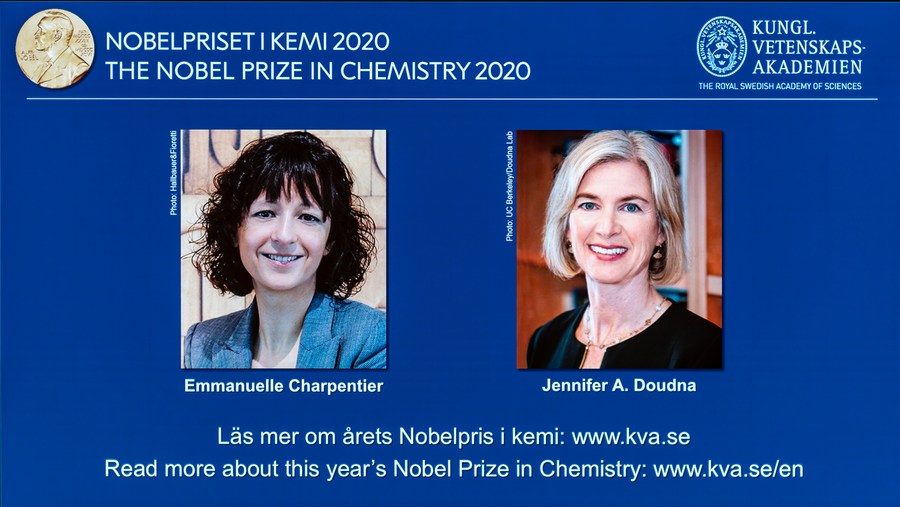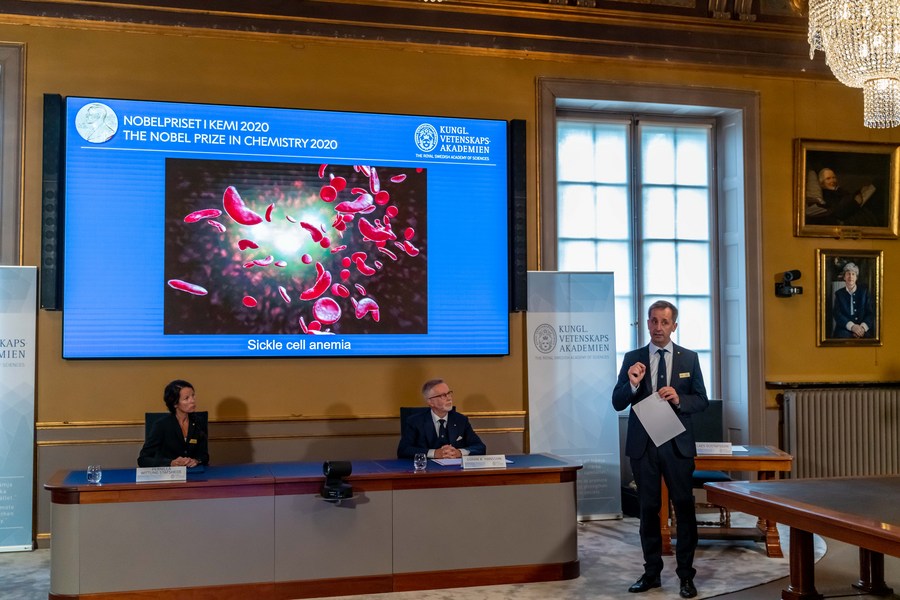
Laureates of the 2020 Nobel Prize in Chemistry, Emmanuelle Charpentier and Jennifer A. Doudna, are seen on screen during the prize announcement in Stockholm, Sweden, on Oct. 7, 2020. (Photo by Wei Xuechao/Xinhua)
The prize went to Emmanuelle Charpentier with the Max Planck Unit for the Science of Pathogens in Germany and Jennifer A. Doudna from the University of California, Berkeley "for the development of a method for genome editing."
The two scientists have discovered one of gene technology's sharpest tools: the CRISPR/Cas9 genetic scissors.
STOCKHOLM, Oct. 7 (Xinhua) -- The 2020 Nobel Prize in Chemistry has been awarded to two scientists for their discovery on genome editing, the Royal Swedish Academy of Sciences announced on Wednesday.
The prize went to Emmanuelle Charpentier with the Max Planck Unit for the Science of Pathogens in Germany and Jennifer A. Doudna from the University of California, Berkeley "for the development of a method for genome editing," according to a press release from the academy.
The two scientists have discovered one of gene technology's sharpest tools: the CRISPR/Cas9 genetic scissors. Using these, researchers can change the DNA of animals, plants and microorganisms with extremely high precision, and moreover, it is now possible to change the code of life over the course of a few weeks, said the release.
"There is enormous power in this genetic tool, which affects us all. It has not only revolutionized basic science, but also resulted in innovative crops and will lead to ground-breaking new medical treatments," Claes Gustafsson, chair of the Nobel Committee for Chemistry, was quoted in the release as saying.
Since Charpentier and Doudna discovered the CRISPR/Cas9 genetic scissors in 2012, the tool has contributed to many important discoveries in basic research, and plant researchers have been able to develop crops that withstand mold, pests and drought, said the release.

Claes Gustafsson (R), chairman of the Nobel Committee for Chemistry, explains the achievements of the 2020 Nobel laureates in Chemistry during the prize announcement at the Royal Swedish Academy of Sciences in Stockholm, Sweden, on Oct. 7, 2020. (Photo by Wei Xuechao/Xinhua)
"In medicine, clinical trials of new cancer therapies are underway, and the dream of being able to cure inherited diseases is about to come true," said the release. "These genetic scissors have taken the life sciences into a new epoch and, in many ways, are bringing the greatest benefit to humankind."
"Very surprised!" said Charpentier in the on-site telephone interview, adding that the discovery, the CRISPR/Cas9 genetic scissors, "have the opportunity to develop therapeutics to defeat bacteria."
She added that as a female scientist, she was very happy to get the prize and wanted to send a "strong message to young girls who would like to follow the path of science, and to show them that women in science can also be awarded (Nobel) prizes."
Charpentier, born in 1968 in France, got her Ph.D. in 1995 from Institut Pasteur, Paris. She is the director of the Max Planck Unit for the Science of Pathogens in Berlin, Germany.
Doudna, born in 1964 in Washington, D.C., got her Ph.D. in 1989 from Harvard Medical School. She is a professor at the University of California, Berkeley, and an investigator at Howard Hughes Medical Institute.
This year's prize amount is 10 million Swedish kronor (about 1.12 million U.S. dollars), to be shared equally between the two laureates. ■



